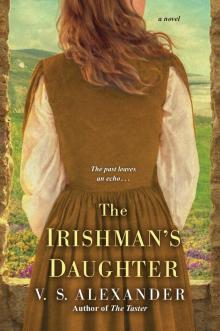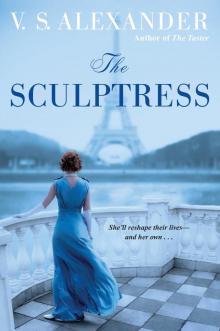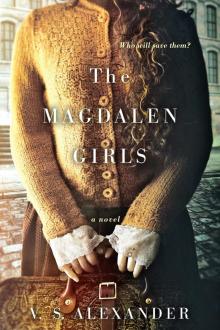- Home
- V. S. Alexander
The Irishman's Daughter Page 10
The Irishman's Daughter Read online
Page 10
“Certainly not,” Lucinda said. “A few handfuls of oats won’t feed dozens of squatters, let alone the tenants.”
Briana ate a spoonful of oats and then placed her utensil on the table. “There must be something we can do.”
Lucinda dug into her bowl, looking thoughtful as she ate. “I’ll write a letter to Sir Thomas asking for his help—in the hope that he gets it before he departs Manchester for Lear House. He’s the only one who can save us.”
“Really!” Briana chided her. “Too little, too late. If Sir Thomas failed to deliver my letter to you, he already knows what’s going on here. It’s the mark of a callous man.”
Lucinda shot her sister a disapproving look and quietly excused herself from the table.
Brian gazed at the breakfast in front of him. He had lost his appetite and doubted that Sir Thomas would get the letter in time. He leaned back in his chair and studied his daughter. He could tell Briana was fuming by her reddened face and blazing eyes. Lucinda, however, had been the picture of clarity and poise as she walked to her bedroom to craft her message to the landlord.
Briana swirled the hot water in the tub with a washcloth.
“I have no time for such foolishness,” Briana said. She looked at her father—his pasty face sagged in the candlelight flickering from the table. “A letter to the landlord will do no good, I’m convinced. We must save ourselves.”
Her father picked up the note signed MM, read it again, and placed it on the table.
Briana read it as well, and her blood boiled. She didn’t care if her father saw her anger as she gathered the breakfast dishes and put them in the tub.
I can’t wait to give Rory Caulfield a piece of my mind. If this is the murderous group he’s joining, I have no use for . . . She stopped the thought. No use for . . . She couldn’t convince herself to think it without shuddering. No use for Rory? How could she live without him? A man might live without a woman, but no woman could live without a man! That was the way it had been since Adam and Eve. She didn’t want to believe her own musing—she knew widows and a few spinsters, but no woman ever flourished without a man in the family. It didn’t seem fair.
She grabbed a towel from the hook and dried the bowls and cups. They would be returned to the place where they always sat in the old oak cabinet her grandfather had made seventy years before. She studied each piece as she placed them on their shelves. A spiderweb of light played across their dull surfaces. There was no porcelain china in the cottage—those fine serving pieces were reserved for Lear House. The cottage dishes were cracked and chipped from age, scarred by use, but still serviceable. Their shine had diminished long ago, but history followed them—a story that couldn’t be changed.
“May I take this letter to Rory?” Briana asked her father when she was done with her task. She spoke softly because she didn’t want her sister to hear.
“Yes, but I’m sure he had nothing to do with this,” he answered. “I’m more concerned about the families gathering outside the estate.”
“Let me handle this.” She wanted to get to the bottom of the note.
“I’m sure you will, but be kind. I know what you think of him.”
His words soothed her somewhat. She put the note in her coat pocket and stepped out into the chilly morning. Shielding her face from the rain, she looked past the tenants’ farms, toward the fences, and up the sloping hillside. The sky was ringed with clouds that dripped like watery fingers from the heavens. The black lumps she had seen still huddled near the top of the eastern hill. On any other rainy day, had she not known the landscape so well, she would have seen them as dark stones upon the landscape. But some of the “stones” had crossed into the tenants’ acreage, while others remained rooted in place.
Rory was talking to Jarlath when she arrived. His brother cocked his head, alerting Rory, who turned, swiping the rain from his face. The pig snuffled around his feet.
“Jarlath and I were discussing what should be done with this fine specimen.” He pointed to the animal. “Either I sell him for as much money as I can, or he gets butchered to feed us for a few months. Either way, I’m glad to have him.”
Briana didn’t want to talk about the pig. “I must see you. Alone.” She nodded to Rory’s brother. “Sorry, Jarlath.”
He bowed slightly, and the rain dripped from his cap. “It’s no matter. The business can be decided at another time”—he pointed to the families gathered around the estate—“but soon, otherwise he may disappear.” He tipped his cap and returned to his cabin.
“What’s the hurry?” Rory asked. The skin around his eyes crinkled with irritation.
“Inside,” Briana said, her anger simmering.
He held the door open as she entered his cabin. Everything was much like it had been the last time she had visited, after the fight. She took off her coat, shook it outside, and then took the page from her pocket. “Look at this,” she ordered.
Rory held the letter to his face and said, “A thousand pounds for my pig? How generous.” He lowered the note and scowled. “Don’t be cruel, Briana. You know I can read but a few words.”
She took the letter back and shook it in front of him. “Of course I know you can’t read, but I thought you might have some knowledge of its content. It’s signed, I believe, by the Molly Maguires.”
“I know nothing of it.” He sat on the three-legged stool near his bed.
“Well, let me educate you, Rory Caulfield. My father found it tacked to the door of Lear House this morning. He was so upset he could barely talk.” She read it to him, in a heavy, concerned voice, emphasizing the threats to the Walsh family and the estate. “Do you know who wrote this . . . tripe?”
Rory shook his head and leaned back against the earthen wall. “They will never hang you or set a torch to Lear House. Can’t you see they’re using the only method they think will get results?”
“Through intimidation and threat?” Briana threw the note on the bed. “This is the group you have so willingly joined?”
“It won’t happen.”
“Why not? You’ve told my father of threats being made against other owners and agents, of livestock being stolen and killed.”
“Do you think the only reason I joined the Maguires was to cut up cows and threaten good people, who for the most part are managing as best they can? I can’t speak for all, but I’m willing to give anyone a fair go.”
He rose and walked to her. She wanted to step away, to ignore the flames that rose in her heart anytime he approached. It would be easy to sink into his arms and let him mollify her, but the situation was much too serious to be blindsided by romantic notions. She stood her ground and asked, “So, why did you join?”
“I want to help my neighbors and friends across Mayo. Nothing that’s written in that note will happen at Lear House. I won’t let it. With Connor and me on the estate you’ll be protected. We’ll know what’s being planned.” He reached for her.
“That’s small comfort.” She turned before he could embrace her. “Then who wrote this? It had to be penned by someone who knows us. How could this get by you?”
“I’m new to the Maguires. Maybe it was someone in the barony. Maybe a lad from Belmullet or Erris? Who knows? Tempers are short and passions are long these days.”
She pushed the note aside and sat on the bed. “That’s why I’m worried. The world’s been turned upside down. We’re in the midst of blight, spread by wind, rain, or the hand of God. No one knows how it got here, and no one can stop it.” She pointed to the east wall, picturing in her mind the people camped outside the estate. “Have you seen what is waiting for us?”
He sat beside her and took her hand. She looked at the strong fingers caressing hers, his flesh hardened, knuckles calloused, from work in the fields. His touch gave her added strength, the feeling that he would protect her family . . . but at what cost?
“Jarlath and I discussed more than the pig,” he admitted. “We walked among the people this morning. No
ne have the fever that we could see, but they have come from those who are dying from it. They had no choice but to leave.”
Briana remembered the lice swarming over the handkerchief of the starving family. “You’ve taken a great risk.”
“I bathed, and so did Jarlath. None of those looking for food had the dark color of the fever or ravings like a drunken man.” He paused. “My brother and I have decided to take in the families we can. We will ask them to bathe and boil their clothes just as we have—and then we will feed them from what we have. Others will do the same.”
“But what if some grow sick? What if the disease spreads to you, then to the other tenants, and then to Lear House? What if you too die?” Her body constricted with a sudden fear.
And what about food? Some stores remained in the manor’s kitchen, but rationing was the only solution until the next potato crop came in—if it came in at all. “I can’t think about it for long, or I’ll go mad,” she said, and leaned against him. Suddenly, she felt like a selfish, insolent child longing for more than she could have. It seemed the only answer was to make do with less, until . . .
“Believe it or not, I feel the same way.” He moved his hands to her shoulders and gently maneuvered her back on the bed. She wondered if he would try to kiss her, but he lay nestled against her, the heat from his body warming hers.
She looked into his pale blue eyes and touched a lock of his red hair. “I want to do more. . . .”
Rory fixed his gaze upon her. “What can you do?”
She rose on one elbow. “We have a little food at Lear House—not enough for a feast for all—but perhaps I can gather enough supplies to make soup for the hungry. We will share what we can.”
He kissed her, but the picture of those huddling against the rain tempered her thoughts. “If I could let them into Lear House, I would,” she told him. “They would be safe, warmed by the fire, and fed.”
“Your father, as good a man as he is, would never allow it,” he countered. “If word got out to Sir Thomas that the Walsh family was sheltering the homeless, you’d be evicted from the estate before you could offer an excuse.”
She rubbed her hand against his arm, feeling the powerful hardness of his muscles. If opening Lear House wasn’t possible, the idea of feeding those who came to the estate was probable. She had to make it happen.
“I can use the two large stewing pots behind Lear House to feed them. They’re used when the summer guests are in residence,” she said. “There’s only one person I need to convince—my father.” Perhaps, if she got him to talk to the people, her task might be easier.
* * *
A few minutes after Briana departed, Rory grabbed the note, put on his hat and coat, and sprinted to Connor’s home. The heath squished under his boots. He glanced at the wet and starving people as he sloshed up the hill. Soggy figures snaked through the blackthorn hedges and the scrub trees that lined the road to Carrowteige. Hands reached into the branches, snapping them. Near the edge of the lane, piles of earth had appeared. The nameless faces were making sceilps, burrows they would line with sod and cover with branches to serve as shelters. The men worked while they had the strength to do so. Maybe there were too many people to take in as he and Jarlath had discussed. Their scheme was a plan born out of pity and kindness but upon further consideration it may have lacked practicality.
His anger rising, Rory jumped the low fence that delineated Connor’s land, leapt across the potato ridges, and stopped at his neighbor’s door. Connor’s home was larger than most, constructed to accommodate his wife, four children, and previously the grandparents who had died a few years earlier. Sturdy lintels crossed the two windows on the front of the house. Those beams along with a tidy thatched roof lent a solid appearance to the structure, more so than many of the mud huts. Through one of the windows, he saw Connor’s wife, Sheila, bent over the fire. Connor, clad only in his breeches, was talking to his children.
He hammered his fist against the door while peering through the window.
Sheila looked up in surprise and disappeared for a moment before opening the door. She smiled at Rory. “Come out of the rain. You look as mad as a wet cat.”
“I need to speak to your husband,” Rory said stoically.
“My husband? I’m not sure I like that after the fight.” She clasped Rory’s jaw with her hand. “You seem to be on the mend.” She hitched her thumb over her shoulder. “My poor husband can barely keep his shirt on with all his bruises.”
Connor scooted his wife to one side. “Shoo,” he said. “Get back to the fire.” Sheila patted his stomach and went back inside. Connor stuck out his hand in greeting.
Rory shook it. “Close the door.”
He shut it. “Why so serious?”
Sheila was right. Connor’s chest and stomach were still bruised from the blows Rory had landed. He had never expected to inflict such damage on so stout a man. Connor noticed Rory giving him the eye. “You did me in,” the man said. “A father of four should think twice before he takes on a bachelor.”
Rory handed him the letter. “Do you know what this is about and who placed it on the Lear House door?”
Connor scoffed. “I read as well as you do.” He studied the note. “Makes no sense to me. I can make out a few words I don’t like. What does it say?”
Rory’s jaw clenched, but he forced himself to relax. “It says the Mollies are going to burn Lear House to the ground and hang Brian and the entire family.”
“Jesus and the Holy Ghost.” Connor whistled and crossed his arms. “Who would say that?”
“I’ve been to one meeting with you,” Rory said, “and nothing of the sort was ever discussed. If this is the way the Mollies operate, I want nothing to do with it. Brian was rattled, and so was Briana.” He squeezed closer to Connor to get out of the rain. “The Maguires have standards, you know—‘assist to the utmost the good landlord in gathering rents; cherish and respect the good landlord and agent; take no arms’—so whoever wrote this note didn’t give a hang about the rules.”
The Molly gathering that Connor had taken him to after the fight seemed more like a social than a rally of angry tenants. The men had congratulated them on a good fight. During the meeting, one of the more educated men from Carrowteige had read the rules. The rest of the time, everyone exchanged gossip and drank poteen. In fact, nothing was accomplished other than to set the next meeting. Rory overheard uttered threats to agents and landlords, but they seemed more like boasts than plans. Only the men’s sullen looks underscored the severity of their talk.
“We’ll get to the bottom of it when we meet next,” Connor suggested.
“I suppose,” Rory said. “I hate to wait another three weeks. Have you seen what’s going on?” He pointed to the black dots lining the hillside.
Connor shook his head and raised a hand to cover his brow. “What is that?”
“Starving people.” Rory was amazed how easily the words slipped off his tongue.
“You’re full of good news, aren’t you?”
“Yes, bloody full of it.” He watched as a few men emerged from the sceilps that now lined the road into the village. “I’m going to talk to them. Jarlath and I are going to do what we can.”
“What?”
“Feed them—take them in?”
Connor backed against the door and shook his head. “I applaud your Christian charity, but I can’t . . . you understand . . . what if they’re sick? I’ve a wife and four children in this house. If they’ve got the fever, I want no part of it. I won’t expose my family to that.”
Rory understood. A man needed to protect his wife and children. If he were in Connor’s position he might do the same. Both he and his brother, despite his family, were willing to take the risk if the men and women agreed to bathe and boil their clothes. He pulled his coat tight and stepped back into the rain. “None of us should have to deal with the fever or the famine, but I’m afraid that’s what the Good Lord has given us—our Cross to bea
r. We must make the best of it.”
“I wish you a good day and blessings upon you.” Connor opened the door and stepped inside. “I’ll find out who wrote that letter.”
Before Connor closed the door, Rory caught sight of Sheila and the children gathered around the fire. They were eating and drinking from their cups and bowls and looked as happy as a sunny spring day. Someday, he and Briana would have children of their own. His desire had never faded over the years, and only his respect for her and Brian had tempered his sexual appetite. On long summer nights when he could see Briana, his hormones had nearly gotten the better of him.
But how long could the peaceful picture before him last? It reminded him of stories he had heard about medieval castles under siege from warring clans. The castle was protected for a time, but under continuous attack it fell. He had a horrible feeling, as he made his way toward the starving people, that the castle was about to fall.
* * *
Briana was surprised to find Daniel Quinn, the poet, and Father O’Kirwin at the cottage when she returned from her visit to Rory. She greeted them, placed her wet coat near the turf fire, and then warmed her hands in the heat. She had last seen the poet in the fall before the blight hit. He looked older, thinner, with strands of gray threading through his black hair. The priest looked the same as when she had seen him at Mass the previous Sunday, perhaps his face a little more sour from ferrying over from Belmullet in the rain.
The conversation had died with her entrance, and she debated whether to go into her bedroom. She looked past the fire into Lucinda’s room where a candle burned on the desk near the window. She could see only her sister’s hand as it moved pen across paper.
No. There’s nothing they can’t say in front of me. She sat on the piecework rug near the fire because all the chairs were taken.
Her father harrumphed. “As I was saying . . . they have no legal right to be on this property or to demand anything from Lear House.”
Briana bristled at her father’s words, although they were true. Even though Sir Thomas wasn’t on the property, her father was bound to carry out the owner’s wishes. Those legalities made it highly unlikely that he would agree to feed those who had gathered, therefore holding the lives of the starving families in his hand. She lowered her head and gazed at the red, blue, and green patterns in the rug; her spirits sagged as she listened to him.

 The Irishman's Daughter
The Irishman's Daughter The Sculptress
The Sculptress The Taster
The Taster Her Hidden Life
Her Hidden Life The Magdalen Girls
The Magdalen Girls